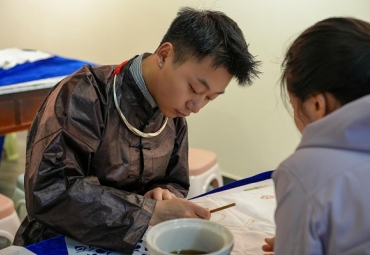
Guardians of an ancient migration
2025-11-25For more than 600 years, the people of the Tunpu, fortified villages of the Ming Dynasty (1368-1644), in Anshun city, Guizhou province, have kept alive customs rooted in a military migration that took place centuries ago, when soldiers and their families from Central China were stationed here to guard the area.

Guardian of a vanishing song
2025-09-01In the small, picturesque village of Xiaohuangcun, nestled deep in the heart of the Dong ethnic region of Congjiang county, Guizhou province, an ancient tradition still resonates.
Embroidery stitches a modern yarn in Jianhe
2025-08-12Big hills and small hills, rakes and harrows, long table feasts, these rhythms of Long Nyusanjiu's childhood in Jianhe county, Southwest China's Guizhou province, remain the wellspring of inspiration for her rare metal-thread embroidery.
Guizhou's rural fashion show debuts in Japan
2025-06-05Over a dozen villagers from Southwest China's Guizhou province staged their first runway show at the China Pavilion of Expo 2025 Osaka on June 4, drawing crowds of onlookers who gathered for photos.
Dough sculptor blends tradition with pop culture
2025-05-14From the legendary general Guan Yu with his long blade to Star Wars icons wielding lightsabers, 37-year-old Chen Yuan from Guizhou province sculpts classic characters to bring dough to life.

Young artisan transforms Miao embroidery into modern fashion accessories
2025-05-08By carrying forward his family's legacy, 23-year-old Miao artisan Liu Yongyi is breathing new life into the age-old craft of embroidery.
Girl garners attention for unique martial arts skill
2024-11-28Ten-year-old Liu Shuhan, a girl from a rural village in Bijie, Guizhou province, has drawn public attention for her skillful balance on the soft rim of a plastic basin — a feat many liken to the martial art qinggong.
All rights Reserved. 京ICP备13028878号-8

 Overview
Overview Guiyang
Guiyang Guian New Area
Guian New Area Liupanshui
Liupanshui Anshun
Anshun Qianxinan
Qianxinan Qiandongnan
Qiandongnan Qiannan
Qiannan Zunyi
Zunyi Tongren
Tongren Bijie
Bijie China (Guizhou) Intl Alcoholic Beverages Expo
China (Guizhou) Intl Alcoholic Beverages Expo Big Data Expo 2025
Big Data Expo 2025 Decoding China's five-year plan
Decoding China's five-year plan 

